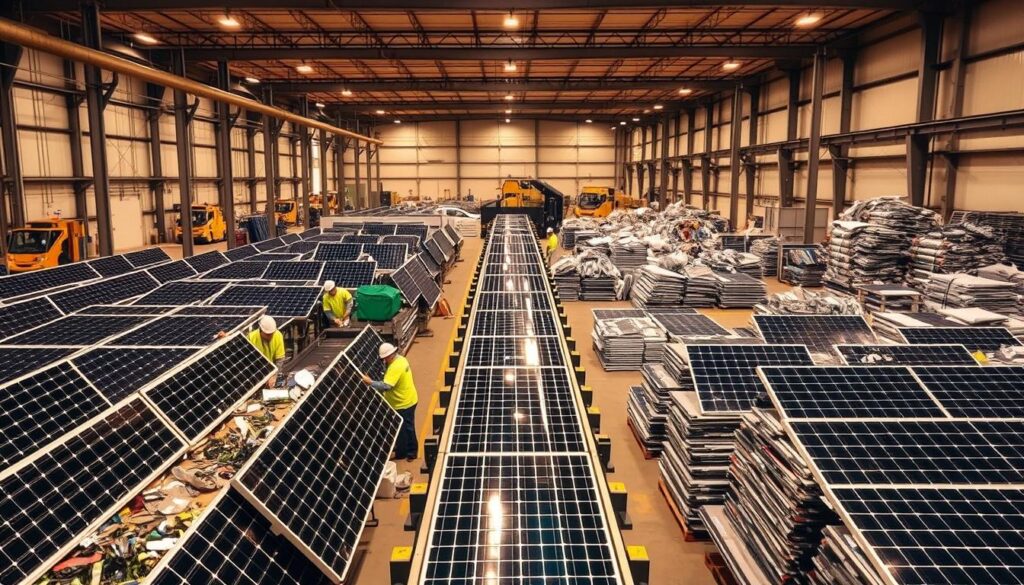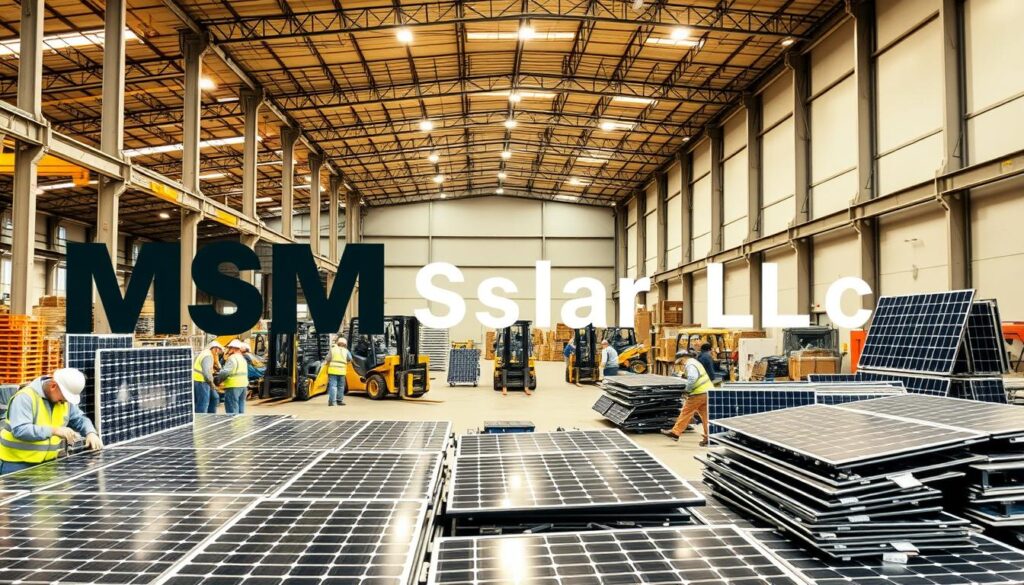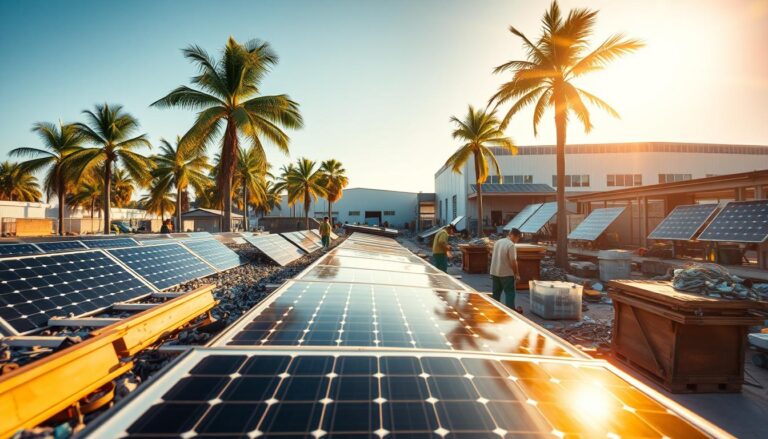Florida now powers over 17,000 megawatts of homes and businesses using clean energy. That’s enough to light up millions of houses! I’ve watched neighborhoods from Tampa to Orlando embrace this shift, with rooftops gleaming under the sun.
But here’s something many don’t realize: these systems last 25–30 years.
What happens next?
Proper disposal matters—for the environment and local regulations. As someone who’s helped dozens of neighbors navigate this process, I know it can feel overwhelming.
That’s where MSM Solar LLC comes in. We’re Florida’s trusted experts, making sure old units get a second life responsibly. Let’s break down how to handle this smoothly.
Key Takeaways
- Florida ranks among the top states for renewable energy adoption.
- Most systems need replacement after 25–30 years of use.
- Local regulations require eco-friendly disposal methods.
- Reusing materials reduces waste and supports sustainability.
- Professional services like MSM Solar LLC simplify the process.
Solar Cost Calculator – Florida Panhandle Only
* Estimate based on $3.25 per watt for solar installation.
* For Tesla Powerwall 3 Batteries, $15,000 for the first battery, $12,000 for each additional battery.
* Other variations and types of Batteries are available.
Why Recycle Solar Panels in Florida?
After a hurricane swept through Miami, I stumbled upon shattered energy units leaking toxic substances into the soil. That moment showed me how crucial proper end-of-life management is—not just for compliance, but for our communities.
The Environmental Impact of Solar Panel Waste
Cracked units can release cadmium, a heavy metal that seeps into groundwater. During a storm cleanup, I saw firsthand how lead solder and polymer backsheets threatened local wildlife. Nearby, a ranch lost livestock after drinking from contaminated ponds.
These materials don’t belong in landfills. When improperly handled, they harm ecosystems and public health. Recovering valuable components, like silicon and glass, reduces the need for raw mining.
Florida’s Solar Panel Recycling Regulations
The FDEP requires testing for hazardous materials before disposal. If units meet federal criteria, they’re treated as special waste. Non-hazardous ones follow standard solid waste rules.
Florida encourages certified recyclers to maximize material recovery. Compared to stricter states like California, our approach balances practicality with protection. As a local, I’ve learned that following guidelines keeps our beaches and farms safe.
We protect our environment together—one responsible choice at a time.
How Solar Panel Recycling Works in Florida
Did you know your old energy equipment could become anything from smartphone parts to sleek storefront windows? Here’s how the magic happens.
Step 1: Collection and Transportation
I’ll never forget coordinating a 200-unit removal from a Jacksonville school. Glass breaks easily—that’s why we use padded trailers with shock-absorbent frames. Companies like SOLARCYCLE handle bulk transport to facilities in Texas or Arizona.
Pro tip: Temporary storage costs 15–20% less than immediate processing, but delays risk weather damage.
Step 2: Dismantling and Hazardous Material Removal
A friend learned the hard way why DIY is dangerous—he inhaled silicon dust while prying apart components. Professionals wear respirators and use sealed chambers to isolate cadmium and lead solder.
On-site testing can extend usable life by 5–10 years. I’ve seen units deemed “dead” still powering streetlights after minor repairs.
Step 3: Material Recovery and Repurposing
Here’s what blew my mind: 50 old modules yield enough silver for 300 smartphones! Advanced sorting recovers 95% of materials:
- Silicon: Refined for new energy units
- Glass: Melted into tiles or windows
- Aluminum frames: Sold to auto manufacturers
Last month, I spotted upcycled panel glass in a Miami boutique—proof that sustainability sparks innovation.
The Benefits of Professional Solar Panel Recycling
Watching a Naples farm profit from old equipment changed how I view end-of-life solutions. They earned $1,200 just from metals—money that would’ve been buried in a landfill. Here’s why expert help matters.

Compliance with Environmental Laws
I once saw a client nearly fined for improper disposal. Professional services handle permits and testing, ensuring EPA standards are met. SOLARCYCLE’s reports even track materials from pickup to reprocessing.
Peace of mind is priceless. Last year, a compliance certificate saved a Miami school district from $3,000 in penalties.
Maximizing Material Recovery and Value
That Naples farm? Their undamaged inverters fetched extra cash—a common oversight. Experts recover:
- Metals: Aluminum frames resold to auto companies
- Glass: Repurposed for construction
- Silicon: Refined for new production
Bulk projects (100+ units) often qualify for discounts, slashing transportation costs by 20%.
Convenience and Cost Savings
Renting dumpsters and hauling debris myself? Never again. Pros streamline everything—I’ve seen audits uncover 30% overcharges at landfills.
Value isn’t just monetary. One less headache means more time for what matters.
Choosing the Right Solar Panel Recycling Service in Florida
Last summer, I spent weeks calling different providers before finding one that would handle my neighbor’s small setup. Many companies reject projects under 100 units—leaving homeowners stranded. That’s when I learned what truly makes a reliable partner.

What to Look for in a Recycling Provider
Certifications matter. Always verify FDEP-approved handlers, like MSM Solar LLC. Their team carries full liability insurance—something I’ve seen save clients from costly surprises.
Transparent pricing is another must. One provider quoted me double the standard rate for “urgent” pickup. Now, I insist on written estimates upfront.
Why Choose MSM Solar LLC for Your Recycling Needs
They helped my mom’s 12-panel setup when others refused. Unlike national chains, they prioritize local partnerships and offer:
- Same-day pickup for storm-damaged equipment
- Free audits to maximize material recovery
- No hidden fees—even for small projects
When I called (850)737-5197, they answered within three rings. That’s the kind of service that protects both your wallet and the environment.
Conclusion
Clear space now—don’t wait. Old equipment takes up room and risks damage. Call (850)737-5197 today. Let’s protect our sunshine together.
Looking ahead, battery recycling programs will expand options. For now, trust a service that treats your property like their own. Together, we’ll keep Florida shining.




